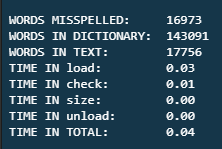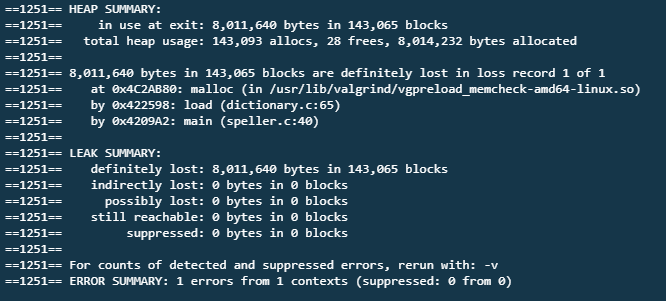Code is below, but can also be found here: https://repl.it/repls/BubblyUnripeTreesedited code out to not spoil it for everybody
// Implements a dictionary's functionality
#include <ctype.h>
#include <stdbool.h>
#include <stdio.h>
#include <stdlib.h>
#include <string.h>
#include "dictionary.h"
// Represents number of buckets in a hash table
#define N 26
// Represents a node in a hash table (+1 is for null char in case word with max length)
typedef struct node
{
char word[LENGTH + 1];
struct node *next;
}
node;
// GLOBAL VARS
// 1. A counter to count amount of words in dictionary
int dictionarycounter = 0;
// 2. Represents a hash table - array called hashtable of N pointers to datatype node - a struct defined in line 15 - 1 bucket per letter
node *hashtable[N];
// Hashes word to a number between 0 and 25, inclusive, based on its first letter - 0 for word that starts with a/A, 1 for word that starts with b/B, ..., 25 for word that starts with z/Z.
unsigned int hash(const char *word)
{
// returns an unsigned int by performing calculation with ascii values
return tolower(word[0]) - 'a';
}
// Loads dictionary into memory, returning true if successful else false
bool load(const char *dictionary)
{
// Initialize hash table ("code that initializes all of the pointers in hashtable to NULL") - hashtable is an array of N pointers to nodes - here we dereference each pointer to NULL
for (int i = 0; i < N; i++)
{
hashtable[i] = NULL;
}
// Open dictionary ("which is the file name of a dictionary to load") | FILE *fp = fopen("file.txt" or filepointer without quotation marks, mode)
FILE *file = fopen(dictionary, "r");
// check for file not being a nullpointer
if (file == NULL)
{
unload();
return false;
}
// Buffer for a word (array of chars) of size length + 1 (+ 1 to make room for the null char in case a word is max length)
char word[LENGTH + 1];
// Insert words into hash table
while (fscanf(file, "%s", word) != EOF)
{
// hash the word
int index = hash(word);
// create a new node
node *new_node = malloc(sizeof(node));
// check for the new node being a null pointer
if (new_node == NULL)
{
printf("Error, out of memory.\n");
unload();
return false;
}
// point new_node to NULL
new_node->next = NULL;
// assign the current word in the loop to the new node's word value
strcpy(new_node->word, word);
//check for collision (check if there already is a linked list with another node at the given index) - if hashtable[index] = NULL means there are no nodes yet linked to that index
if (hashtable[index] == NULL)
{
// insert new node at the start of the bucket
hashtable[index] = new_node;
}
else
{
// simplifying the code below as hashtable[index] is already a node
new_node->next = hashtable[index];
hashtable[index] = new_node;
/** create pointer to first node in a given hashtable (i.e. define head node)
node *head_node = hashtable[index];
// make new_node point to the first node
new_node->next = head_node;
// point head to new_node (make new_node the new head node)
head_node = new_node;*/
}
// count words in dictionary
dictionarycounter ++;
}
// Close dictionary
fclose(file);
// Indicate success
return true;
}
// Returns number of words in dictionary if loaded else 0 if not yet loaded
unsigned int size(void)
{
// we defined this as a global variable and also counted words in the load section
return dictionarycounter;
return 0;
}
// Returns true if word is in dictionary else false
bool check(const char *word)
{
// convert each word to full lowercase
int x = strlen(word);
char same[x + 1];
for (int i = 0; i < x; i++)
{
same[i] = tolower(word[i]);
}
same[x] = '\0'; //adding null char at the end
// getting the hash of the word being checked
int index = hash(same);
// create a pointer to the head node (point to the first word in a hashtable given a certain hash depending on word hashed)
node *head = hashtable[index];
// looking for the word in the hashtable
while (head != NULL) // while not reaching end of list (last node points to NULL)
{
// if word is found return true
if(strcmp(head->word, same) == 0)
{
return true;
}
// if not found, move to next node
head = head->next;
}
// when end of list is reached and thus the word isn't found
return false;
}
// Unloads dictionary from memory, returning true if successful else false
bool unload(void)
{
// loop through buckets
for (int i = 0; i < N; i++)
{
while (hashtable[i] != NULL)
{
node *tmp = hashtable[i];
hashtable[i] = hashtable[i]->next;
free(tmp);
}
/** code above does the same as code below
//point to first node in the linked list at current bucket
node *bucket = hashtable[i];
// check for not receiving a NULL pointer
if (bucket == NULL)
{
return false;
}
//as long as the next field of the node isn't NULL, we haven't reached the last node and thus we need to keep freeing every node we loop
while (bucket != NULL)
{
// create temporary node to keep track of the first node in the list ! (so we don't orphan the list)
node *tmp = bucket;
bucket = bucket->next;
// free current node
free(tmp);
}*/
}
return true;
}

